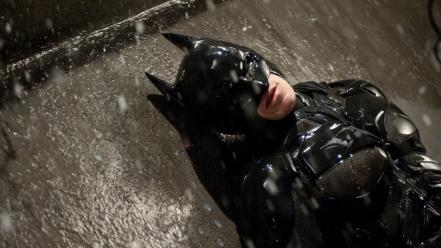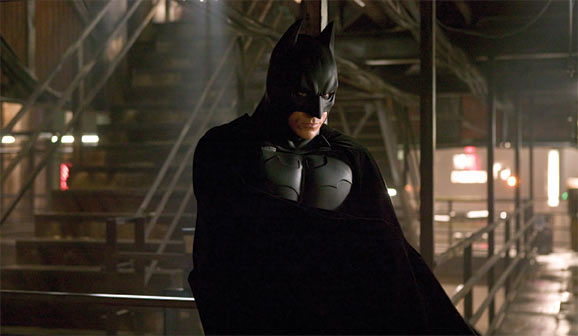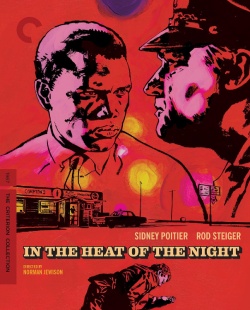A swarm of bats crowding en masse to create the traditional Bat symbol. It may seem like an obvious way to start off a film about The Caped Crusader, but no previous adaptation had ever managed to introduce the popular superhero with such a masterful visual summation. Batman Begins gave modern audiences that image as a new way to kick off director Christopher Nolan’s adaptation of the Bob Kane created comic book hero, born out of a desire from Warner Bros and DC Comics to finally wash the taste of 1997’s atrociously awful Batman & Robin from people’s mouthes. This introduction to the current generation’s cinematic perception of Batman premiered on June 15, 2005 and ushered in a new decade of superhero cinema that started to treat the characters of comic book lore with a sense of gravity. Now, the question is; was that for the best? Did Nolan’s take on the universe in Begins & his subsequent follow ups give a sense of legitimacy to the art of adapting superheroes or did it give people both in the studio system & audiences in general the wrong idea of what a comic book adaptation should be?
To give credit where credit is due, many of the elements in Begins can be seen in some of the more famous stories in Batman’s long history. Namely, the critically acclaimed Frank Miller retelling of the hero’s origins story in Batman: Year One. That story explores Bruce Wayne’s initial days as The Caped Crusader, fighting with mob bosses and meeting his eventual ally James Gordon. That relationship is one of the core elements that persists throughout Christopher Nolan’s entire trilogy, with Gordon representing the few officers in Gotham that haven’t been corrupted by the extensive influence of Carmine Falcone. Their partnership gives Batman not just an edge in the Gotham Police Department, but also a growing mutual respect that helps keep the two character sane in the ever decaying world of Gotham around them. Similarly, the endearing surrogate father relationship Alfred has with Bruce gives both of them an influence to survive and thrive while Wayne attempts to fulfill the Herculean task of being a hero for Gotham. These relationships are particularly potent in Begins and The Dark Knight Rises, which showcase just how lowly a state these characters can be in before they eventually climb to a better emotional balance in their lives.

Sometimes this lowly state ends up being at the sacrifice of other characters, particularly some of the female characters that can often be used as devices for the males to be developed. This is especially apparent with Marion Cotillard’s Miranda Tate/Talia al Ghul character in Rises, who is merely there for an additional twist of the “jilted lover” cliche and add to Bruce Wayne’s ever expanding flaws that hurt his attempt at being a masked vigilante. It’s a common problem Nolan has in his films both within and outside the trilogy, but it sometimes can work in his favor when casting the right actress. I’d still say Maggie Gyllenhaal’s portrayal of Rachel Dawes in The Dark Knight manages to add more of an engaging personality to her than Katie Holmes attempted in Begins, setting up her chemistry & moral integrity with Harvey Dent and lack of sympathy for the life Bruce put himself in as Batman in ways that felt believable for a lawyer trying to clean the streets of Gotham legally, no matter how tragic that ends up being for her in the end. As a solid juxtaposition, Selena Kyle in Rises shows an alternate mirror to that stability Wayne could have had with Rachel, giving him a life of danger & constant movement that would remove him from his responsibilities in the only way he really could escape after everything he’s gone through as Batman.
In fact, another facet of the trilogy that’s very clear from the start of Begins is that Christopher Nolan recognizes how much of a toll the persona of Batman takes not just on Bruce Wayne, but on the citizens of Gotham he directly encounters and the city in general. Often times adaptations of the character will take the ideal that despite his actions, Bruce Wayne is ultimately doing the right thing for the city and its inhabitants in general. Yet in The Dark Knight Trilogy, Batman’s entrance is treated less like an instant cure for the disease and more of a painful regiment that seriously agonizes those he effects. It’s a pain that ends up costing Bruce Wayne the love of his life, Gordon the family he constantly attempted to protect, Alfred what remains of his adopted family and Gotham the luxury of dealing with normal street thugs as opposed to the escalating threats of chaotic villains once Batman starts attempting to save their city. All of this shows that Wayne is less of a completely cool headed hero that knows every single possible pitfall that could take place and more of a very human man with his heart in the right place but a head strong nature & hang up on emotional guilt that often causes his life to tumble out of control & lose further hope in his ability to save the city he’s betrothed to. Hope like that is an elusive entity in Gotham, changing hands from an eventually corrupted self imposed savior Harvey Dent to proselytizing rebellion leader Bane to the selfless Dark Knight himself as he finally gets rid of that bomb.
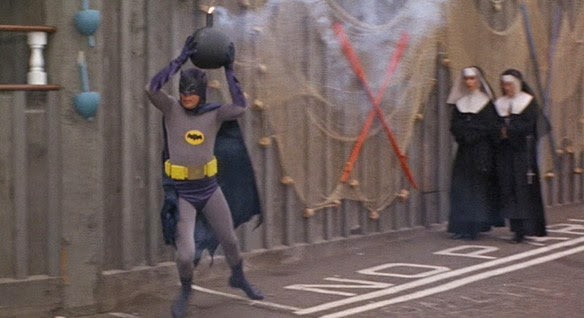
All of this speaks to a common misconception people seem to have about Nolan’s trilogy. The series often gets credit for being a “realistic” version of Batman, not featuring any of the more supernatural themed villains (aside from Ra’s Al Ghul, though he’s clearly a much more subdued version of himself without a Lazarus Pit) and removing some of the more silly traditional aspects like a grappling hook or traveling with a child ward. Much of these assumptions come from the far more grounded style in which Christopher Nolan not only crafts the universe on a world building level, but also how close it is visually to the firmly grounded crime dramas of Michael Mann. It’s the kind of development that makes Gotham this amalgamation of multiple metropolitan areas that could stand in for any number of different cities. However, Nolan himself has spoken to the idea that his trilogy isn’t so much genuinely gritty realism as much as it is a more grounded take on the character that fits within its own cinematic reality that bends the laws of our normal reality.
In other words, Christian Bale’s Batman may have more of a realistic tinge than Adam West’s campy take on the character from the 60s, but still is capable of taking leaps in real world logic that are called for within the universe that’s been set up. Of course, this does bring up the question of why Batman potentially having a grappling hook is any more outside of the box than say Batman carrying a nuclear bomb with his batplane off into the middle of the ocean. Yet, those overt moments allow for wiggle room for the reality of this universe to expand beyond what one would consider real world, such as the various speeches characters give to each other or Batman being able to save citizens from long falls. Some may argue it’s a cop out, but it feels like a natural extension of how far into comic book logic territory this series was willing to go based on the cinematic language Nolan portrayed.
Of course, many studios have tried to apply this sensibility to their franchises in the wake of Begins and especially The Dark Knight. Just a year after Begins, we saw a more grounded modern take on James Bond with Casino Royale that breathed new life into a franchise that had been dismissed by many as silly & overdone after Die Another Day. Obviously, Royale had been in production by the time Begins came out, but the similarities in tone and execution can’t be denied. The influence became even more clear by the time Skyfall came around and took many pages out of The Dark Knight‘s book, with a villain that desires to be captured for his plan and set pieces where London’s explosion heavy destruction recall some of the property damage of Gotham by The Joker. Mind you, it’s an influence that fits quite well on that new take of Bond, allowing for unrealistic over the top moments in between the grounded espionage.

Those certainly fit more than other attempts at adding the darker revamps of superhero properties like Man of Steel or The Amazing Spider-Man. Even fantasy based properties have been given this treatment with the likes of Snow White & The Huntsman and the Ridley Scott Robin Hood. All of these were clear attempts by their studios (or in some cases Warner Bros. itself) to cash in on that darker and grittier angle Begins established and Knight & Rises rode to billions of dollars worth of success. The problem is all of those films take the downbeat angle and merely use it as a filter to hollowly reproduce the feel of Nolan’s trilogy while adding ridiculous elements that are indicative of familiar limp blockbusters rather than effectively applying mature concepts & filmmaking techniques to their characters, whether it be the whiney angst of Amazing‘s Peter Parker or Steel‘s underdeveloped Christ figure loner of Clark Kent. The latter obviously makes me worried about the influence of Nolan’s trilogy on the upcoming crop of DC Cinematic Universe films, which could seem to be following Man of Steel‘s example of copying that gravity instead of implementing it in context of their characters, which is even worse considering Nolan himself produced that effort.
Honestly if any franchise managed to do a solid job of applying the grounded tone to a superhero context, it’s been the Marvel Cinematic Universe properties. Sure, they’re more willing to take flights of fancy than Christopher Nolan ever was, but Marvel still managed to make its characters feel real within the universe its established, right from first Iron Man when we are introduced to a weapon selling billionaire named Tony Stark. In fact, Iron Man director Jon Favreau mentioned Begins as an influence, but in the more appropriate fashion of a superhero film with a committed cast and a filmmaker’s clear perspective. The latter point is especially important, because Favreau applied his own improvisation style to the character in a fashion that felt appropriate and it’s something that Marvel has stuck to, from the Shakespearian vibrato of Kenneth Branagh in Thor to the kinetic comedic energy of James Gunn in Guardians of the Galaxy. They can still embrace the basic comic book sensibilities at the core of their properties while grounding the films in a relatable sense of emotional weight that feels appropriate for their individual styles. Hell, even Netflix’s Daredevil grounded itself in a similar darkness while still managing to weave in the fantastical and light hearted elements that felt appropriate for that character. That’s why those adaptations managed to speak more to audiences than Man of Steel‘s mere cut and paste “super duper serial, you guys” attitude towards its properties, which may only get worse given Warner Bros & DC’s worrying lack of a consistent voice for their upcoming slate.
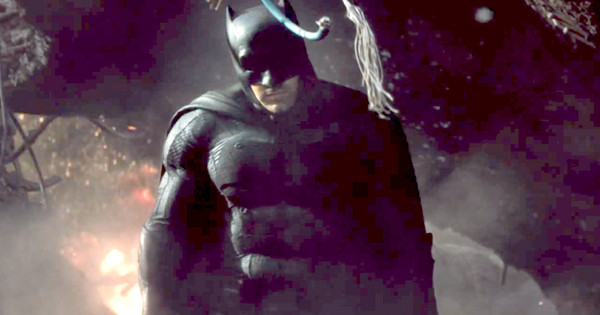
So, it’s clear that Christopher Nolan’s multibillion dollar earning franchise had an effect, one that has resulted in a mixed bag of imitators. Then again, thus is the trend of Hollywood. People often try to tap into the zeitgeist by copying aspects of a popular film without getting the full grasp of what their impact was. Did The Dark Knight Trilogy merely impress because it was dark and brooding? Of course not. People gave those films so much money because it gave them characters that were emotionally relatable and themes that were consistently compelling in between the spectacular action sequences, even in a context that allowed for explosions and lengthy monologues. People were invested in the story of Gotham’s corruption and a search for hope that Nolan’s trilogy provided, even at its most ridiculous. The brooding darkness was just an appropriate dressing for those characters, themes and settings to thrive in. Hopefully, Batman V. Superman: Dawn of Justice will take a page from that emotionally grounded book while embracing the lengths of ridiculousness that Nolan didn’t approach… or at the very least not have Ben Affleck speak in a throat cancer voice all the time.
